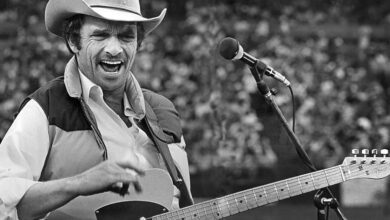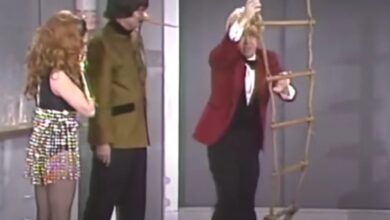Buck Owens’ “Act Naturally” Tops the Charts and Redefines Country’s Edge in 1963
In 1963, Buck Owens released “Act Naturally,” a song that would not only earn his first number-one spot on the Billboard Country Singles chart but also usher in a new era for country music. Built on simplicity, twang, and sincerity, the song’s relatable lyrics and stripped-down production made it a breakthrough moment—not just for Owens, but for the growing Bakersfield Sound that rejected Nashville’s slick polish.
Born Alvis Edgar Owens Jr. in Sherman, Texas, Owens relocated to Bakersfield, California, where he emerged as a leader in the city’s thriving honky-tonk scene. There, he helped shape a grittier, more electrified form of country music that leaned on Fender Telecasters, barroom rhythms, and emotional directness. With a unique voice and a nose for honest songs, Owens began building what would become a legendary career.
“Act Naturally” was inspired by a real-life moment of inconvenience and irony. Songwriter Johnny Russell, after canceling a date to attend a recording session, joked that he’d be perfect for playing a lonely guy in a movie. That offhand remark sparked the lyrics. Co-written with Voni Morrison, the song eventually landed in Buck Owens’ lap, and although he hesitated at first, he recorded it—and history was made.
The song was recorded on February 12, 1963, at Capitol Studios, with Owens’ band The Buckaroos backing him. The track featured the now-iconic crisp, bright guitar picking and a production style that kept things raw and live. Owens’ lead vocal had just the right mix of vulnerability and sarcasm, and the whole thing was done with a sense of effortless confidence.
Upon release, “Act Naturally” shot up the charts, spending four weeks in the number-one spot. Its charm was undeniable, and it stood in stark contrast to the heavily orchestrated arrangements coming out of Nashville at the time. It was proof that country audiences were ready for something more down-to-earth—music that sounded like real life, not a stage play.
The song’s cultural reach widened significantly when, just two years later, The Beatles covered it in 1965, with Ringo Starr on vocals. Their rendition introduced “Act Naturally” to millions of rock fans around the globe and showcased the universal appeal of the song’s theme—loneliness, heartbreak, and putting on a brave face. It was a rare moment where country and rock genuinely shook hands.
For Buck Owens, the success of “Act Naturally” marked a turning point. It cemented him as a force in the genre and kicked off a string of hits that would dominate country radio for the next decade. The song didn’t just make him famous—it validated the Bakersfield Sound as a real, marketable counter to Nashville’s dominance.
Its influence echoed across the country music spectrum. Artists like Merle Haggard, Dwight Yoakam, and even contemporary stars have cited Owens as a foundational influence. The song’s success inspired a generation of musicians to embrace electric guitars, hard-hitting lyrics, and live-performance energy, steering the genre in bold new directions.
Over the years, “Act Naturally” has been covered by countless artists. From Loretta Lynn to Dwight Yoakam, and even a duet version recorded by Owens and Ringo Starr in 1989, its legacy has been kept alive in numerous musical styles. The song’s staying power lies in its simplicity—it tells a story anyone can recognize.
At the time of its rise, Owens’ career was entering its most prolific era. “Act Naturally” led to heightened demand for live performances, TV appearances, and ultimately helped launch Owens into household-name status. He soon became a fixture on shows like Hee Haw and an ambassador of country’s more relatable, rootsy side.
Even decades after its release, “Act Naturally” continues to enjoy steady airplay and reverence. It appears in country music retrospectives and greatest-hits collections, reminding each new generation of its enduring relatability. Its balance of humor and heart remains one of country’s most effective storytelling templates.
The song also influenced production trends. By showing that a simple, heartfelt track could top charts without strings and choirs, it paved the way for rawer studio aesthetics and stripped-down acoustic arrangements. It also reinforced that sincerity could often speak louder than polish.
In 1996, Buck Owens was inducted into the Country Music Hall of Fame, a recognition long deserved. His contribution to the genre—and to artists across styles—can’t be overstated. “Act Naturally” was the catalyst that brought his vision to life and gave him a permanent place in the story of American music.
“Act Naturally” is more than a novelty hit. It’s a perfect example of how an offhand joke, turned into a song, can resonate with millions. Owens took something small and personal and made it feel big and universal—exactly what great country music is supposed to do.
Looking back, “Act Naturally” wasn’t just a song. It was a statement. It carved out a space for artists who didn’t fit into Nashville’s mold and proved that country could be smart, funny, and heartbreakingly honest all at once. Its impact still echoes in every barroom guitar riff and every line about smiling through the pain.



